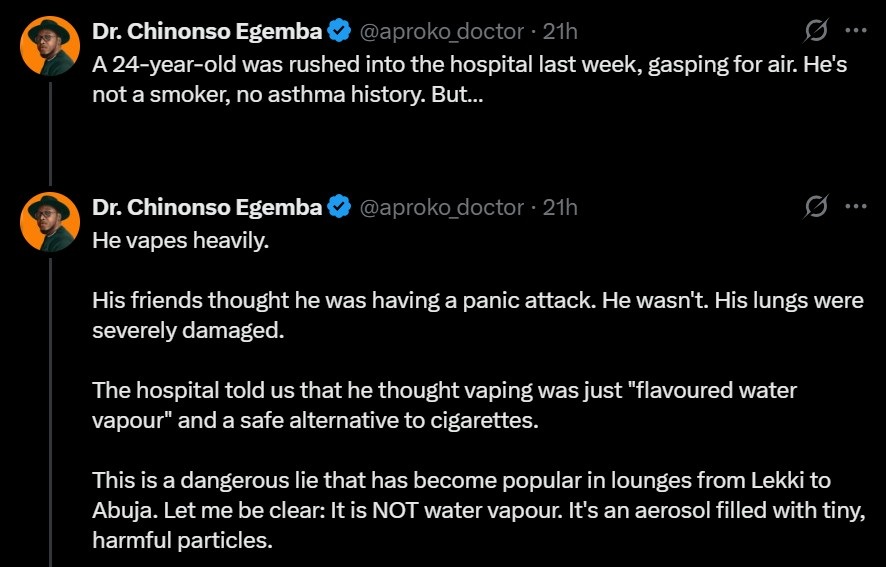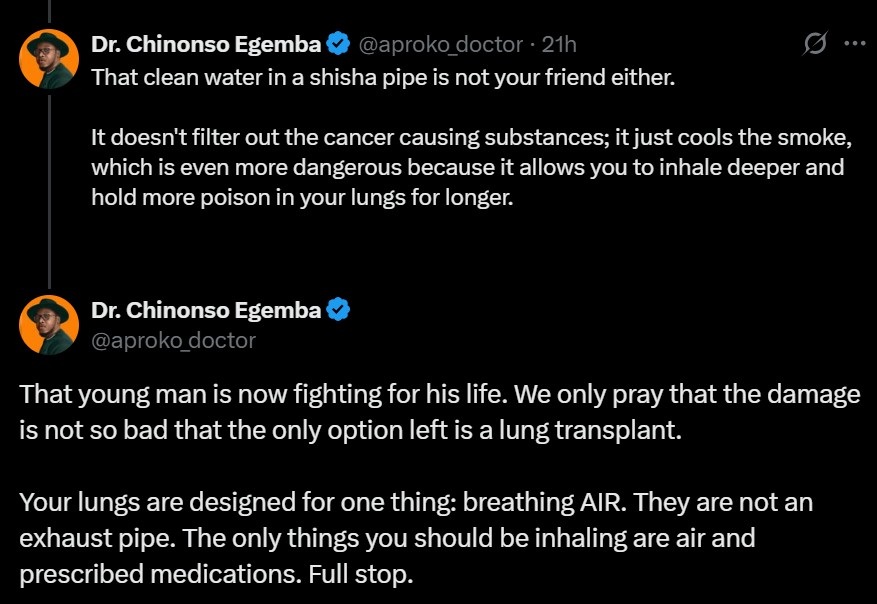Nigeria’s health sector is once again in the spotlight as a well-known medical influencer, often referred to as Aproko Doctor, has sounded an alert over the growing risks associated with vaping among young people. His public health warning follows the recent emergence of a troubling case involving a 24-year-old Nigerian man, who is now fighting for his life after developing complications reportedly linked to vape usage.

According to Aproko Doctor, who shared the incident in detail across several tweets on https://x.com/yabaleftonline, the young man arrived at the hospital in severe distress, desperately struggling to breathe. Notably, the patient had no known history of asthma or cigarette use, but was reportedly an avid vaper—a practice increasingly seen as a safer alternative to traditional tobacco smoking.
Initial speculation by the young man’s friends suggested he was suffering from a panic attack, which is not uncommon among youth in high-stress situations. However, further medical evaluation revealed a much graver scenario: extensive damage to his lungs, so severe that he required intensive care. This case has reignited important conversations about the hidden dangers of vaping, particularly among young adults in Nigeria and across West Africa.
Medical consultations with the patient uncovered a widespread misconception: he sincerely believed vaping involved inhaling only “flavoured water vapour,” convinced it posed no real threat to his health. The idea that vapes are merely harmless clouds of scent and taste has gained traction in urban centres and among university students across Nigeria and Ghana, according to local health educators.
Aproko Doctor, in his widely shared posts, emphasized the danger of such myths:
He noted that misinformation about vaping and shisha (waterpipe) use is not only common, but potentially deadly. “Thinking shisha or vape is just water and flavour is a dangerous belief,” he warned, adding that this assumption puts young Nigerians at risk of severe lung injury and other chronic health conditions.
As of the time of reporting, the 24-year-old patient’s condition remains critical, with doctors closely tracking his recovery. There are ongoing discussions among his medical team about the possibility of a lung transplant if his health does not improve. Such an extreme intervention highlights the grave risks that can accompany the seemingly innocuous habit of vaping.
Growing Vaping Trend Raises Red Flags in Nigeria and West Africa
Vaping and shisha smoking have become increasingly popular among West African youth in recent years, driven in part by aggressive marketing, social media influence, and the perception of these alternatives as being “cool” or less dangerous than conventional smoking. According to the World Health Organization (WHO), e-cigarette and vape use is on the rise in Africa, even as policymakers race to catch up with effective regulation.
In major Nigerian cities, vape shops and lounges are thriving, with many young adults experimenting with flavoured vaping liquids. Yet, as cases like this 24-year-old’s illustrate, the supposed safety of these products is largely unproven. Unlike regulations in some Western countries, oversight of vape products in Nigeria is minimal, and many imports are unregistered, meaning their ingredients and true health impacts remain unclear.
What Makes Vaping So Risky?
- Unknown Chemicals: Many vape liquids contain chemicals that can cause lung damage when heated and inhaled.
- Lack of Regulation: Nigeria and most African countries have yet to fully develop or enforce laws governing vape product safety.
- Youth Vulnerability: With aggressive social media influence and lack of awareness, West African youth are particularly susceptible to misinformation.
- Rising Health Incidents: Hospitals in Lagos, Accra, and other major cities have reported rises in vape-related respiratory illnesses, though comprehensive data is still lacking.
Local Reactions and Expert Commentary
Lagos-based pulmonologist Dr. Chinedu Okeke explains, “We’re now seeing a new wave of patients presenting with sudden, unexplained lung injuries. Most of them are young people who switched from cigarettes to vapes or shisha, thinking these alternatives are safer. The science doesn’t support that assumption.”
Community health advocate Ngozi Ojukwu from Abuja adds, “These products are attracting those who would otherwise avoid tobacco altogether. Our job now is serious education—young people need to know what they’re actually inhaling into their bodies.”
While some argue that vaping could help adult smokers quit conventional cigarettes, global health authorities stress that non-smokers—especially young people—should never start using vapes or e-cigarettes.
Regulatory Landscape: Are Nigeria’s Laws Keeping Pace?
Regulation of vaping and shisha in Nigeria is currently limited. While some states have enacted bans on cigarette smoking in public places, only a handful have addressed vaping explicitly. The Nigerian National Agency for Food and Drug Administration and Control (NAFDAC) has issued warnings but comprehensive policy action remains pending, partially due to the newness of the trend and lack of local data.
- Comparative View: In other African countries, such as South Africa and Kenya, more stringent controls and public education campaigns are being considered or have been put in place in recent years.
- International Benchmarks: Globally, several countries—including India, Brazil, and Thailand—have enacted partial or total bans on e-cigarettes. The World Health Organization is calling for tougher action worldwide.
Challenges and Broader Implications
For many young West Africans, vaping represents modernity, independence, or simply a social activity. But the harsh reality is that a lack of information can put lives at risk. As the latest patient fights for his recovery, the Nigerian public faces important questions about how to balance personal freedom against the community’s responsibility to reduce health risks.
According to pharmacist Akin Shonibare in Ibadan, “What we need now is not just warnings, but an entire shift in public perception and better access to facts on these products, both online and in schools.”
Some members of the public push back, arguing that vape-related harm is rare or that adults have a right to choose, but others agree that urgent education and regulation are necessary to protect young people from preventable harm.


Conclusion: Facing the Reality of Vaping Risks
This harrowing case has served as a catalyst for renewed debate and reflection in Nigeria and West Africa about the dangers of vaping and shisha smoking among youth. The time for action is now: both individuals and policymakers must prioritise education, regulation, and support for healthier choices.
Want to share your own story, raise awareness, or sell a relevant news tip? We’d love to hear from you! Email us at story@nowahalazone.com and your story could be featured.
For general support or enquiries, reach out at support@nowahalazone.com.
Stay informed on health trends affecting Nigerians and West Africans—follow us on Facebook, X (Twitter), and Instagram for daily updates!










